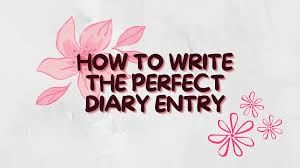Class 10 Exam > Class 10 Notes > English Grammar Advanced > Overview - How to Write a Diary Entry
Overview - How to Write a Diary Entry | English Grammar Advanced - Class 10 PDF Download
| Table of contents |

|
| Introduction |

|
| Diary Writing Format |

|
| Getting Started with Diary Writing |

|
| Why Write a Diary? |

|
| Tips on Diary Entry |

|
| Benefits of Diary Writing- How to Write, Format, Tips and Examples |

|
Introduction
Had a rough day and want to note down something significant that happened? Writing a diary entry is a great way to express yourself or simply document your life's events. Diary writing allows you to record, reflect, and express your experiences and emotions. Keeping a diary can be therapeutic, providing a mental break from the busyness of daily life.

Diary Writing Format

Getting Started with Diary Writing
Starting diary writing can be challenging, especially if you're not used to writing regularly.
Here’s how you can begin:
- Decide What You Want to Write: Determine what you want to include in your diary entries. Diaries typically capture personal thoughts and experiences, but you can also use them to track daily events or specific aspects of your life.
- Design a Schedule: To develop a writing habit, establish a schedule for your diary entries. Decide how often you want to write and choose a specific day or time to do so. Setting a time limit for your writing can also help you manage how much you write and the duration of your sessions.
- Date Your Entries: Including the date in each entry is crucial. It helps you keep track of your progress and review how much you've written over time.
- Give It a Name: Some people name their diaries to create a sense of intimacy, as if speaking to a friend. Feel free to choose a name for your diary or simply start with "Dear Diary" to guide your writing.
- Be Comfortable While Writing: It’s okay if you don’t write in your diary every day. Writing will be easier if you are comfortable and enjoying the process. Focus on making the experience pleasant, and it will become a more natural part of your routine.
Why Write a Diary?

- Effective Catharsis: When it’s hard to find someone to confide in, a diary can act as a trusted friend, allowing you to express your feelings freely and without fear of judgment or misunderstanding. Since only you have access to it, you can share anything in any way you choose.
- Recapture Memories: A diary helps you revisit past memories, whether joyful or challenging, and observe how you’ve grown or what mistakes you’ve made. Reading past entries can evoke laughter or revive nearly forgotten moments.
- Recording Events: Some people use their diaries to chronologically record daily events, ensuring they don’t miss important details. This method helps keep track of occurrences for future reference.
- Problem-Solving: Writing in a diary can help manage overthinking by making problems seem less daunting. As you write, you may gain clarity and discover solutions by reflecting on the issues in a structured way.
Tips on Diary Entry
- Include a Date: Adding a date to each diary entry helps you track when events occurred and provides a timeline of your experiences. This can be particularly useful for reflecting on past events and understanding how time has passed. Simply placing the date in the corner of the page, consistently formatted, is sufficient.
- Mention a Subject: Including a brief subject or dominant emotion at the beginning of your entry can provide a quick reference to the main focus of your writing. For instance, if your entry is about feeling upset due to a conversation with your brother, you might write "Feeling Sad" as a summary.
- Express Yourself Freely: The essence of diary writing is to convey your emotions privately and authentically. Write with an open heart and without concern for anyone else reading it. Your diary is a personal space where you can be completely yourself.
- Write More Often: Establishing a regular writing routine might require setting reminders initially. Over time, writing will become a natural habit. The more frequently you write, the more your diary will become a trusted friend and a therapeutic outlet for self-expression.
- Be Honest: Honesty is crucial when writing in a diary. If you censor yourself out of fear that someone might read it, the diary loses its purpose. Be truthful in your reflections to achieve genuine catharsis and gain a deeper understanding of your thoughts and feelings.
- Aligning Your Thoughts: Before you begin writing, take a moment to organize your thoughts. This can help clear any mental fog and make your writing more coherent. A brief brainstorming session can assist in expressing your emotions and ideas more clearly and effectively.
Benefits of Diary Writing- How to Write, Format, Tips and Examples
Diary writing offers numerous benefits. Before you start your own diary, consider these tips and examples to guide you through beginning your journal entries.
Here are some advantages of diary writing, including how to write, format, and tips:
- By understanding how to write, format, and applying tips and examples for diary writing, you'll become familiar with the essential elements of keeping a diary.
- This knowledge will help you start your journal confidently and ensure you are on the right track.
- Learning the format and rules of diary writing will provide structure and clarity in your entries.
- By using these guidelines, you'll gain insights into what you can write about and how to effectively express your thoughts and experiences in your diary.
The document Overview - How to Write a Diary Entry | English Grammar Advanced - Class 10 is a part of the Class 10 Course English Grammar Advanced.
All you need of Class 10 at this link: Class 10
|
53 videos|210 docs|40 tests
|
FAQs on Overview - How to Write a Diary Entry - English Grammar Advanced - Class 10
| 1. How can diary writing help with self-reflection and personal growth? |  |
Ans. Diary writing provides a private space to reflect on events, emotions, and thoughts, which can lead to a better understanding of oneself. By analyzing past entries, one can identify patterns, triggers, and areas for personal growth.
| 2. Can diary writing improve mental health and well-being? |  |
Ans. Yes, diary writing has been shown to have therapeutic benefits by reducing stress, anxiety, and depression. It can also help in managing emotions, boosting mood, and providing a sense of catharsis.
| 3. What should be included in a diary entry to make it more meaningful and effective? |  |
Ans. A meaningful diary entry should include details about the events of the day, thoughts, feelings, reflections, lessons learned, goals, and aspirations. Including specific details and emotions can make the entry more authentic and impactful.
| 4. How often should one write in their diary for it to be effective? |  |
Ans. There is no set rule for how often one should write in their diary. It is more important to be consistent and write when you feel the need to express yourself, reflect, or document important events. Some people write daily, while others write weekly or even less frequently.
| 5. How can one maintain privacy and security while keeping a diary? |  |
Ans. To maintain privacy and security, it is essential to keep the diary in a safe and secure place, such as a locked drawer or a password-protected digital diary app. It is also important to be mindful of where and how you write in your diary to prevent others from accessing your personal thoughts and feelings.
Related Searches
















